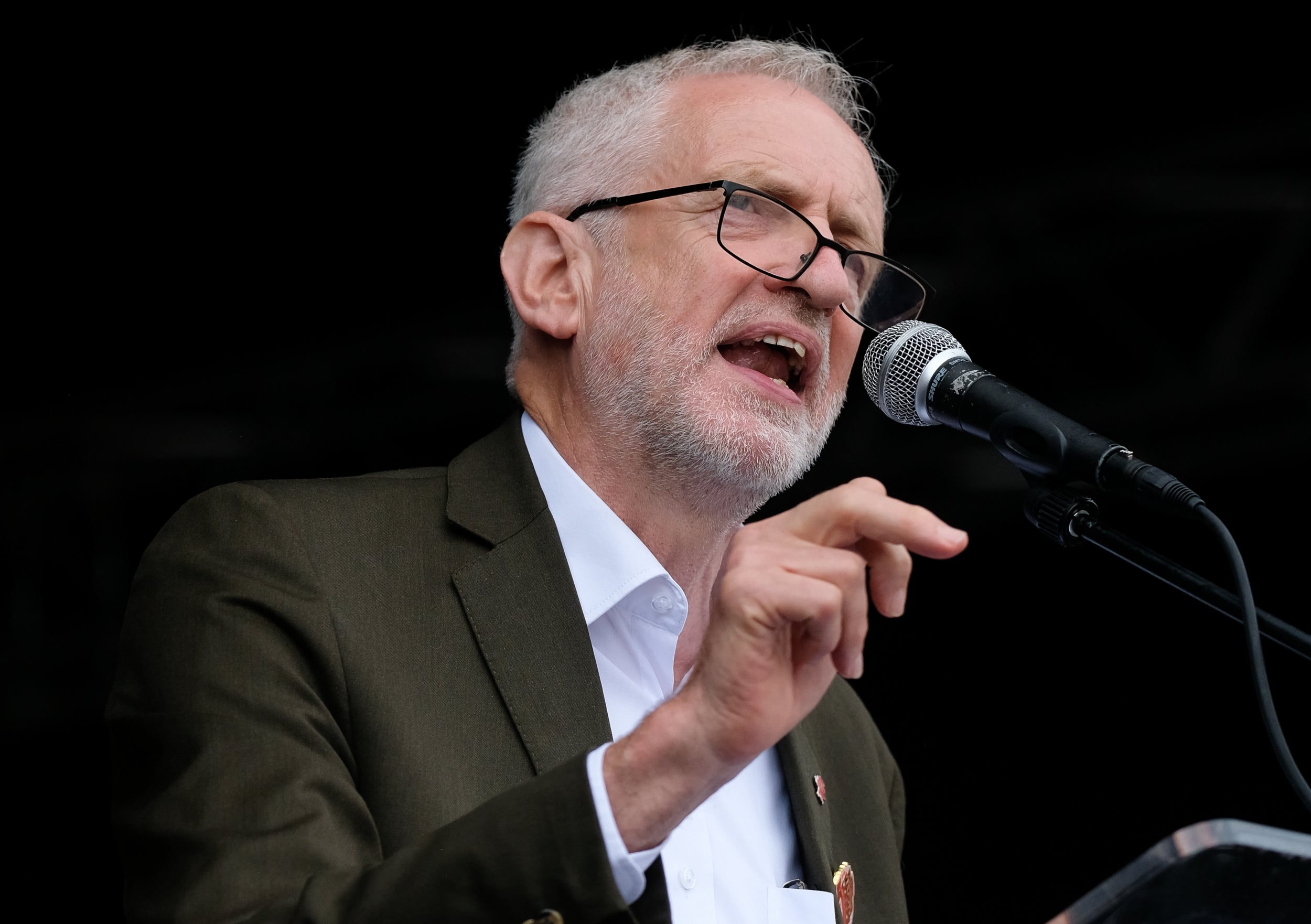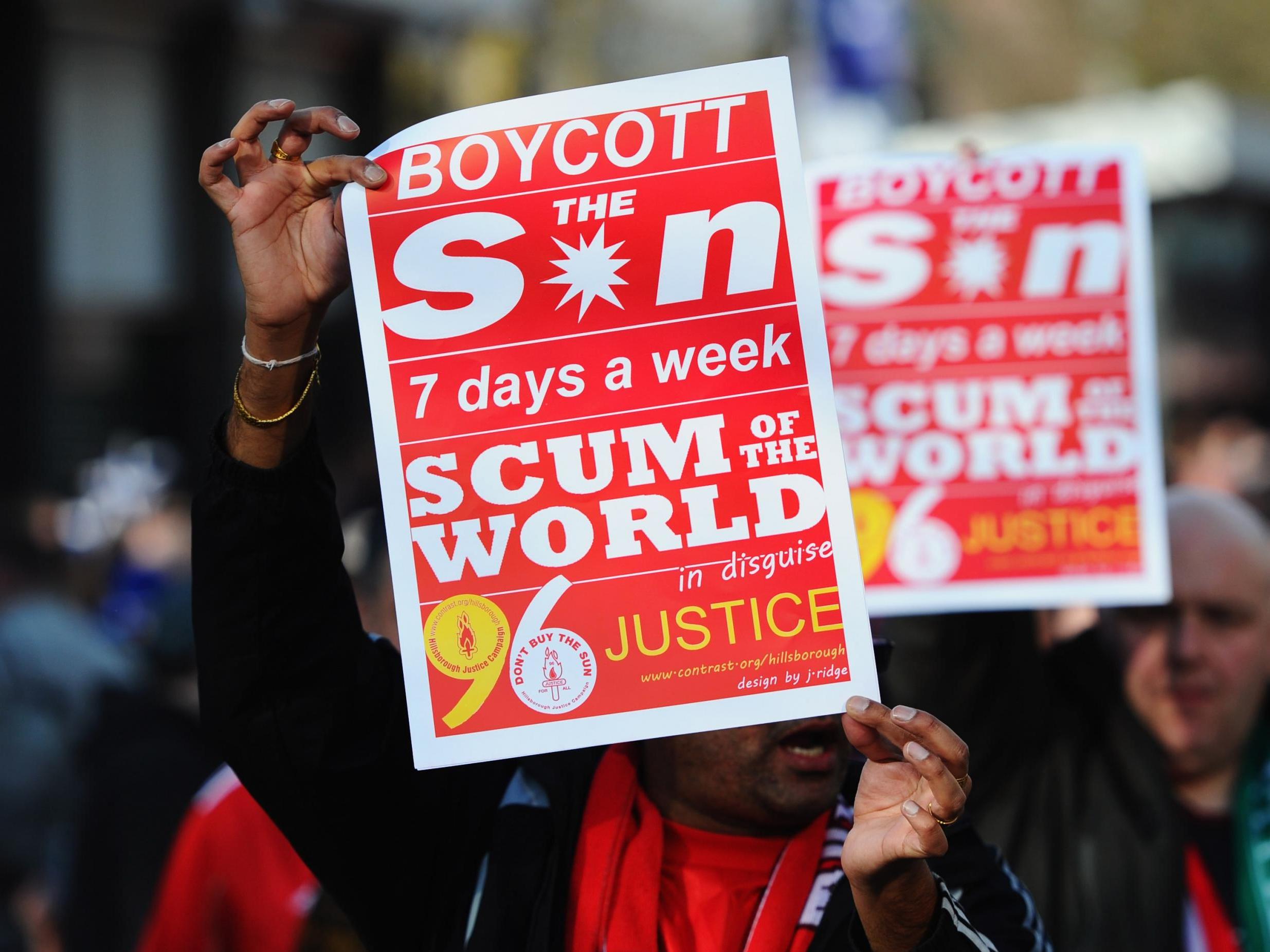Why The Sun boycott has nothing to do with Brexit and everything to do with football
The ‘Don’t Buy The Sun’ boycott is a remarkable piece of community action that is certainly not about Brexit, and one that has proven the righteous rage of people who were considered powerless still matters

Your support helps us to tell the story
From reproductive rights to climate change to Big Tech, The Independent is on the ground when the story is developing. Whether it's investigating the financials of Elon Musk's pro-Trump PAC or producing our latest documentary, 'The A Word', which shines a light on the American women fighting for reproductive rights, we know how important it is to parse out the facts from the messaging.
At such a critical moment in US history, we need reporters on the ground. Your donation allows us to keep sending journalists to speak to both sides of the story.
The Independent is trusted by Americans across the entire political spectrum. And unlike many other quality news outlets, we choose not to lock Americans out of our reporting and analysis with paywalls. We believe quality journalism should be available to everyone, paid for by those who can afford it.
Your support makes all the difference.On Merseyside, almost everything gets related to football. Liverpool and Everton are a huge source of civic pride. It is arguable that too much of the region’s identity is wrapped up in the sport. Nevertheless, the teams matter enormously and have brought great succour to an area that has suffered socially, economically and politically over the decades.
The boycott of The Sun after the Hillsborough disaster of 1989 fused all these currents together. The newspaper printed inexcusable lies about the behaviour of Liverpool supporters on the day of the tragedy that left 96 fans dead. The city came together to express disgust for the tabloid by refusing to buy it. Evertonians have remained staunch alongside their Kopite rivals in shunning the paper. The message ‘Don’t buy The Sun’ is everywhere around Anfield and Goodison. Both clubs have barred reporters from the despised media outlet from their stadiums.
The power of the boycott is reflected in its intensity three decades on from Hillsborough. It has become entrenched in the folk history of the city. So it seemed to make sense when a report by Florian Foos of the London School of Economics and Daniel Bischof of Zurich University suggested that the voluntary proscription of The Sun on Merseyside in the past 30 years had a significant effect on the perceptions of the European Union in the 2016 Brexit vote.
The entirely logical line taken by Foos and Bischof is that Eurosceptic media – The Sun, the Daily Mail and The Daily Telegraph in particular – have influenced the public’s view of the trading bloc. The Sun, the report says, slipped from 55,000 sales per day to 12,000. According to the study, the wider Liverpool region has become more pro-EU during the period of the boycott and this proves the power of newspapers in influencing their readers.
There are a number of flaws in this theory. News UK, The Sun’s publishers, are tight-lipped about the decline in sales but those who have been involved in internal discussions suggest that the figures are much worse than suggested. The customer base has been almost wiped out in this part of the north-west.
On the face of it, this backs up the argument. The reality is different. The study cites the British Social Attitudes survey, an annual review, which recorded that in 1983 more than 50 per cent of Merseysiders supported leaving the EU, a number that fell to less than 15 per cent by the time the study’s parameters were changed in 2004.
There are a number of problems with this. In the 1980s, Liverpool struggled with serious social and economic issues. When the UK became part of Europe in 1973, it hastened the decline of the docks on the Mersey. Britain’s commercial emphasis turned to south-coast ports like Dover and Southampton. In Liverpool unemployment rose, factories relocated and trade went elsewhere.
There was a deep-seated suspicion that being part of Europe led to jobs leaving the city. The English nationalism and anti-immigrant feeling that has underpinned the Brexit debate was completely absent. Liverpool is a city built on waves of inward migration. The mood was not anti-European, it was anti-unemployment.
Added to this, the government of Margaret Thatcher that was elected in 1979 imposed a form of austerity that withdrew resources from local authorities and Liverpool’s left-wing council were embroiled in a losing battle with central government. The Conservative cabinet even considered a “managed decline” of the city – effectively starving residents into relocating. The pre-Hillsborough resentment was largely towards Westminster, something the study does not reflect.

There was also a left-wing anti-European sentiment that has always existed within the Labour Party – Jeremy Corbyn’s muddled approach to Brexit reflects this – and that coloured some views on Merseyside.
Another thing the authors have not taken into account is that Liverpool has been out of step with the mainstream political thinking of the nation for a century and a half. Thatcher’s Britain was pro-Europe. No wonder there was some opposition beside the Mersey.
In the 1990s the mood changed but not because of the boycott. The generations who had lost their jobs in the 1970s as Europe took economic precedence over the Atlantic trade died out. Merseyside’s status as one of the most deprived places in the UK attracted the attention of Brussels and the region benefitted from a series of investments from the EU. The Echo Arena, John Lennon airport, the cruise liner terminal and a host of other landmarks were financed in part with European money. The positivity towards the continent has been generated by the visible impact of the flow of cash from across the channel. To suggest that the anti-Brexit sentiments were largely because people did not read The Sun misses the point and patronises the populace. The Mail, The Express and The Telegraph are widely available and have always been.

The boycott of The Sun is a remarkable piece of community action. It is evidence that a grassroots movement can spontaneously grow, sustain itself and galvanise new generations to action. Many attempts have been made to undermine it but its force comes from the righteous rage of people who were considered powerless.
Academics should examine it and teach its history, methods and message to students. But refusing to buy The Sun should not be used to make political points that do not exist. That undermines its purpose and gives ammunition for those who would minimise its significance. The boycott has had enough real influence without anyone stretching credulity to give it more impact. Not buying The Sun is not just about football but it’s certainly not about Brexit.
Join our commenting forum
Join thought-provoking conversations, follow other Independent readers and see their replies
Comments